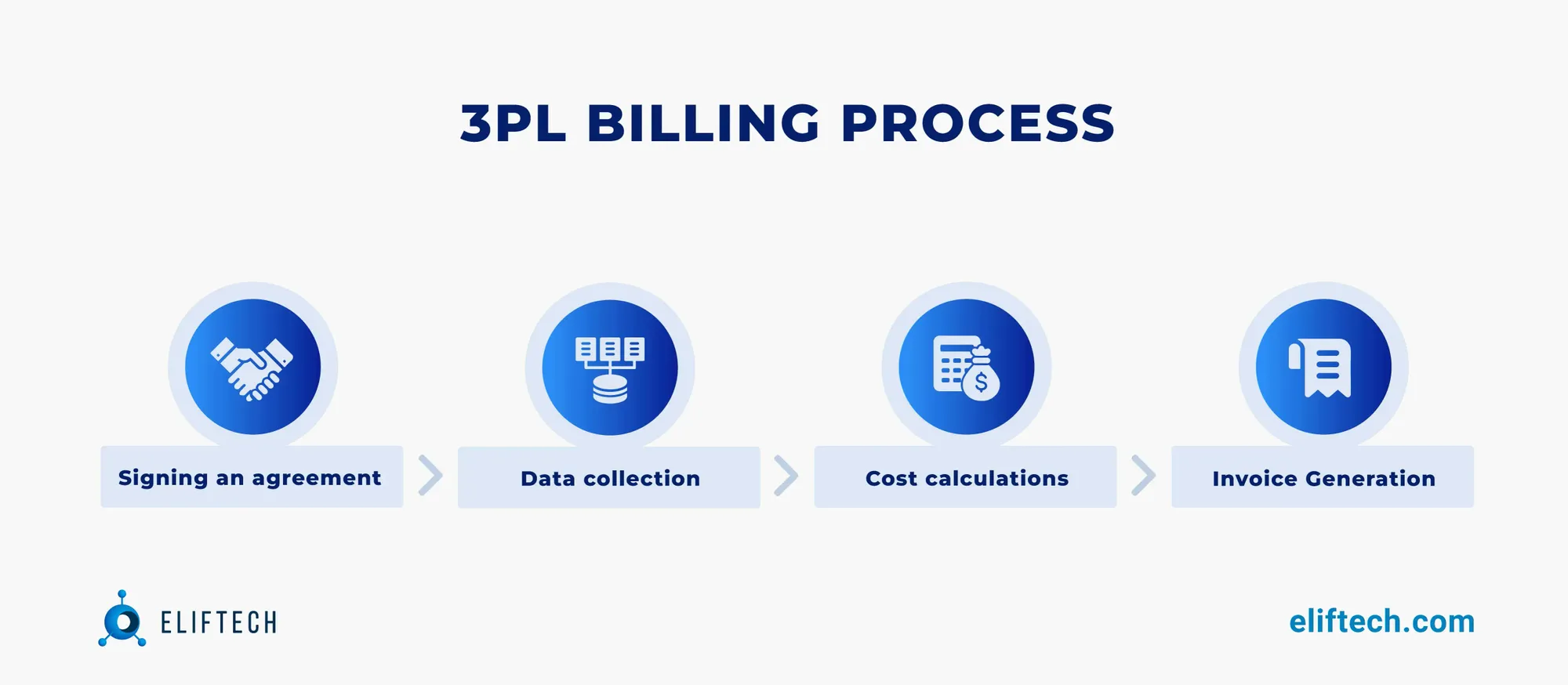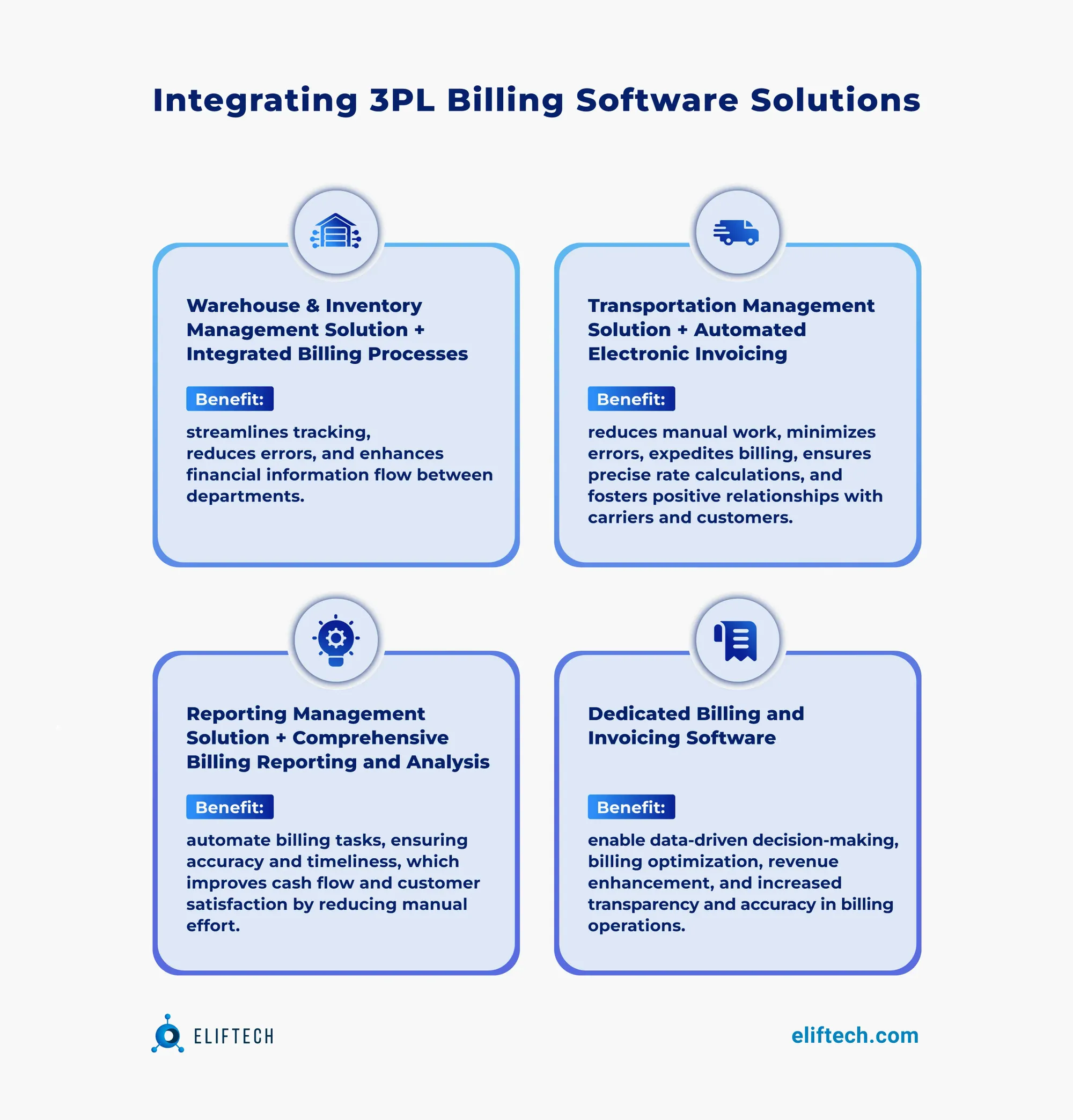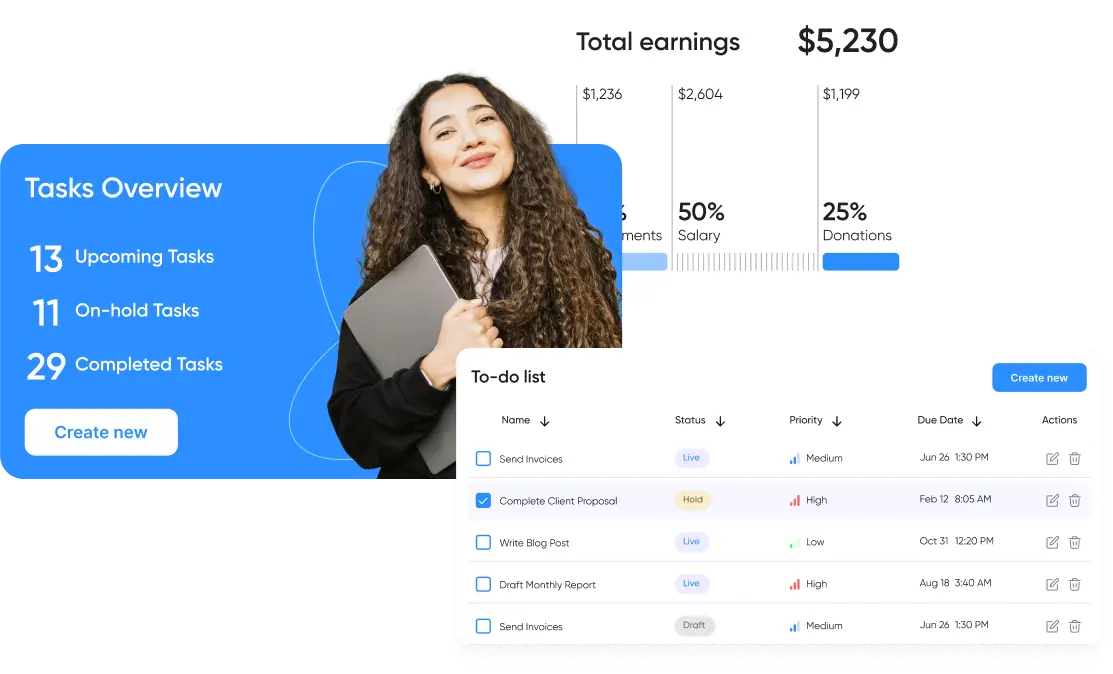Logistics
Building 3PL Billing Software to Automate Rate Confirmation, Contract Signing & Billing
Third-party logistics providers offer different services like transportation, warehousing, and distribution and collaborate with numerous clients, each coming with its rates, diverse billing models, and varied terms of agreement.
Payments, too, take on various forms, including credit cards, electronic funds transfers, checks, and online platforms. Multiple payment methods and reconciling payments with invoices make billing even more complicated. No wonder, businesses struggle with billing and invoicing due to multiple errors while using manual billing & calculating methods.
But can they make their 3PL billing and invoicing process simpler, efficient, and budget-saving? For sure. Integrating 3PL billing software will not only solve the above-mentioned challenges; at its best, it will boost business profits and support positive customer satisfaction.
Let me guide you through the benefits and real-world custom 3PL software solutions for the logistics business in the next post.
The evolution towards adopting specialized 3PL software systems beyond generic, one-size-fits-all solutions is a clear trend. During our research analysis, we found out that 32% of surveyed 3PLs plan to implement billing and invoicing technologies. 3PL providers recognize that traditional approaches fall short of handling the modern, complex billing process with its numerous variables.
However, this trend isn't solely influenced by shifts in the market, increased competition, or global factors. Instead, it's driven by the direct operational needs that businesses can't efficiently address without more advanced billing and invoicing software for logistics.
Behind the 3PL Billing Process
Let’s take a closer look at the typical 3PL billing process that you're likely quite familiar with in your regular operations.

- Signing an agreement. This stage starts with discussions between the service provider and the client. Negotiations may include pricing, service levels, delivery schedules, and liability terms. This information serves as the legal foundation for the agreement, specifying responsibilities, obligations, and dispute resolution mechanisms under which the services will be provided. In some cases, legal teams review the agreement to ensure compliance with laws and regulations.
- Data collection. This is where organization jobs are performed. The logistic provider collects detailed information about each shipment, including origins, destinations, contents, dimensions, weight, and any special handling instructions. For warehousing activities, 3PLs can also gather information on inventory levels, stock turnover, and storage requirements. This stage is when 3PLs make sure to record everything about services provided, from processing orders and packing to labeling and checking for quality.
- Calculations. All this data in hand helps calculate the costs associated with the services offered. This includes everything from transportation fees to storage charges and choosing pricing structures to determine the total cost for each service. For example, storage services may require a monthly fee, while activities such as picking and packaging may be billed per item.
- Invoice generation. Finally, it becomes possible to create the invoice. This document summarizes all the costs, clearly lays out the charges, and gives your client a clear picture of what they owe for the services provided.
Main Billing Challenges in Logistics
We have already mentioned some of the typical problems that prevent businesses from running efficiently. Let's dive into more details on where these problems come from.
Complex customer setups
Logistics customers often need different services with various prices and terms. They may expect personalized deals, like special discounts or unique billing schedules. However, creating individual invoices for each customer can be tricky. And if your company has multiple locations, managing different billing rules for each one makes things even more complex.
Disconnected data
Billing relies on data but can be scattered across various systems, like order processing and inventory management. For instance, in storage facilities, many daily operations happen. If your warehousing and invoicing systems aren't well connected to track and record everything, you'll likely miss something important.
This data fragmentation creates confusion and makes it hard to ensure consistent billing. Connecting these systems is a tech challenge. However, keeping data accurate across all systems is vital to avoid billing errors and chances to increase revenue.
Uncaptured charges
Missed charges can drain revenue silently. They happen when extra services or fees aren't recorded or billed correctly. For example, a logistics company might offer faster shipping, but if it's not tracked and billed accurately, money is lost. Often, businesses manually spot these charges, which is time-consuming and prone to mistakes. Automation tools are needed to catch these extra charges proactively.
Time delays and errors
Manual processes slow down billing and introduce errors. Typing data manually, especially with many transactions, increases the chance of mistakes. Complex calculations in billing performed using Excel spreadsheets can also lead to errors when done by hand. Manual invoicing can create delays in sending out bills. These delays and errors not only hurt efficiency but can also cause customer problems and disputes.
Lack of visibility and real-time tracking
If your customers often have questions about their bills, it's a sign that you lack visibility into the billing process. This is a common challenge for many businesses still using legacy systems, making it difficult to track invoice progress or identify real-time issues. When customer inquiries go unanswered, and billing errors aren't caught until after invoices are sent, it can lead to frustration and delays in resolving issues. Inefficient issue resolution can further complicate these problems, negatively impacting cash flow and customer satisfaction.
3PL Billing Software Solutions (as Integrations)

Logistics providers often use different software systems in their operations, but not all of them handle billing and invoicing. The good news is that billing modules can be added to existing systems or developed separately to meet specific billing needs and solve challenges.
Each type of 3PL billing software serves specific aspects of logistics and takes care of different billing tasks. For example:
Warehouse & Inventory Management Solution + Integrated Billing Processes
Overview: Warehouse and inventory management solutions are primarily designed to optimize the storage and handling of goods within warehouses. These systems integrate billing processes to manage the charges associated with storage, handling, and other warehouse services.
How It Works: These solutions automate billing for warehouse services. They calculate charges based on factors like storage space, time, handling tasks, and additional services. This integration ensures accurate and timely invoicing for all warehouse-related services.
Benefits: By integrating billing with warehouse management, businesses can effortlessly track and bill for services. This reduces errors and billing disputes. Plus, it streamlines the flow of financial information between warehousing and billing departments.
Read More: Building 3PL Warehouse Management Software: Types, Elements, Cost, Setup
Transportation Management Solution + Automated Electronic Invoicing
Overview: Transportation management solutions are about ensuring goods move efficiently and managing relationships with carriers. They often include one standout feature: automated electronic invoicing. This feature makes billing for transportation services easy and optimized.
How It Works: Billing software for logistics company do the heavy lifting when it comes to invoicing for transportation services. They calculate rates, create invoices, and send them electronically to customers. They can even handle tricky billing scenarios, like multi-modal shipping or international freight.
Benefits: Automated electronic invoicing in transportation management solutions means less manual work, fewer mistakes, and quicker billing. It also ensures that rate calculations are accurate. Plus, it helps logistics providers keep good relationships with both carriers and customers.
Order / Delivery Management Solution + Streamlined Automated Invoicing
Overview: Order and delivery management solutions are designed to streamline the order fulfillment process, from order creation to final delivery. They often come with a handy feature - automated invoicing - to ensure services are billed quickly.
How It Works: These solutions do the invoicing work automatically based on orders and deliveries. They figure out charges for things like order processing, packing, and delivery and then create invoices for customers. Automated invoicing lines up perfectly with order fulfillment activities.
Benefits: These solutions save time and effort by doing the billing work for you instead of manual tasks. They also make sure billing is accurate and on time, which means better cash flow and happier customers.
Read more: How Order Management Apps Improve Order Accuracy and Operational Efficiency
Reporting Management Solution + Comprehensive Billing Reporting and Analysis
Overview: Reporting management solutions provide comprehensive insights into core business operations. They often include advanced reporting and analytics features for billing-related data.
How It Works: These solutions let logistics providers create detailed reports and analytics all about billing. You get to see billing trends, what customers are up to, how your money's doing, and how well billing processes are running.
Benefits: Billing insights are like a power-up for logistics businesses. They help you make smart, data-driven decisions with data. You can tweak your billing strategies, find places to get even better, and boost your revenue streams. Plus, it makes billing operations transparent and accurate.
Dedicated Billing and Invoicing Software
Overview: Stand-alone billing and invoicing software are like billing experts that focus solely on one thing - billing. They offer a dedicated solution for handling all your billing and invoicing needs.
How It Works: These 3PL software systems are built to handle every billing aspect. They calculate charges, create invoices, and manage billing data all in one place. They are designed exclusively for billing tasks.
Benefits: A dedicated billing solution simplifies the billing process. It ensures accuracy and efficiency in billing tasks without the complexity of broader software. It's perfect for businesses that prioritize precise billing and invoicing.
Tired of billing errors, frustrating delays, and data fragmentation causing disconnects? Here’s your chance to rebuild your billing process with EllifTech! We help companies deliver logistics solutions with integrated 3PL billing software based on their needs.
How 3PL Billing Software Elevates Billing Functionality
Billing and invoicing software for logistics does its complex calculation job thanks to the powerful capabilities of modern technologies. The below functionality deserves your special attention.
Invoice Tracking, Delivery, and Management
Modern technology brings a big value - it gives 3PLs a real-time view of their invoices, payments, and financial data and automated delivery and management. By staying well-informed about changes regularly, businesses can identify and resolve issues before they escalate into more significant challenges.
And the best part? Automated invoicing calculates charges, includes relevant details, and formats invoices according to your preferences. Yes, you can customize your invoices to match your brand, choose how you want to send them (email or Excel, you name it), and efficiently manage them with timely system alerts when necessary.
Accurate Rate Calculation and Validation
Accuracy matters in logistics billing and invoicing. Manual calculations often lead to mistakes, especially when dealing with complicated agreements and changing rates. 3PL billing software takes care of these calculations automatically. It considers rates based on agreed-upon terms, taking into account various factors like distance, weight, and service type to create accurate invoices.
Think of it this way: computers are simply better and faster than humans at handling these complex calculations. Moreover, the 3PL software systems meticulously double-check these rates against your agreements and service records, leaving no room for uncertainty when it comes to billing errors tied to rates. From this point forward, rate-related billing errors will be a thing of the past.
Automated Charge Validation and Verification
A lot of different activities are involved in your logistics business ecosystem. Each of these activities or services can come with diverse charges—for example, storage billing fees, transportation costs, customs duties, and more. Logistics billing and invoicing software handles these calculations jobs automatically and efficiently and validates them against agreed-upon pricing structures.
But there's another perk: speedy invoice generation. This means your customers get their bills without delays. It shows them your reliability and boosts the chance of getting paid faster.
Proactive Notifications and Real-time Alerts
Real-time alerts ensure that everyone stays in the loop, facilitating quick actions to address any emerging issues. As a user, you can receive timely alerts and notifications about crucial billing and delivery events, whether it's a rate change, an unexpected charge, or a delivery delay. You can also customize notifications for key events like creating invoices, receiving payments, or spotting overdue bills.
With this instant insight, you're in the driver's seat. No more surprises or missed deadlines – just smooth sailing through your billing process.
Advanced Reporting, Analytics, and Insights
3PL billing software isn't just about numbers; it's your data hub. It processes data and provides detailed reports and analytics. As a result, you can get insights into billing trends, how customers behave, your financial performance, and how efficiently your billing process runs.
These insights help you make smart decisions and fine-tune your billing strategy. With data as your guide, you're not just managing billing - you're optimizing it for success.
Seamless Contract Management and Enforcement
A contract management tool simplifies handling various customer agreements. When you onboard a new customer, the software for billing and invoicing steps in to create a dedicated account. It sets rates and tailors billing rules to match your agreements. This ensures that every invoice aligns perfectly with the terms you've agreed upon, simplifying the billing process.
Moreover, you don't have to remember all these agreements because the system automatically generates invoices based on the set billing schedule and agreed rates. Once the invoices are ready, you can email or export them to MS Excel.
Simplified Multi-Currency Conversion
For those navigating global markets, the 3PL software systems simplify currency conversion. It automates the process, allowing you to bill in various currencies effortlessly. This not only streamlines international transactions but also boosts the efficiency of your cross-border operations.
So, whether you're dealing in dollars, euros, or yen, this feature ensures your billing knows no borders, keeping your global logistics presence strong.
Streamlined Documentation and Record Keeping
3PL billing software acts as a centralized hub for all billing-related documents, including contracts, invoices, and payment records. It consolidates information from various sources, such as transportation management systems, warehousing software, and order processing platforms. This centralization minimizes data fragmentation and ensures data accuracy. In turn, robust record-keeping features make historical billing data easily accessible for audits, compliance checks, and references, enhancing transparency.
Enhanced Billing Accuracy and Transparency
Through automation, including calculations and validations, the logistics billing software significantly reduces the risk of billing errors. But it's not just about error reduction; it's about trust-building. With every calculation spot on, your billing operations become transparent. Your customers can access real-time, precise billing information, and that trust grows stronger.
Custom Software for 3PL: The ElifTech Approach to Overcoming Challenges
What can ElifTech do in response to the challenges faced by businesses?
- Ensuring profitability through cost management & prediction. Our custom 3PL billing software helps businesses navigate cost complexities and forecasting expenses, ensuring your operations stay in the green.
- Elevating operations & streamline billing processes. We develop billing and invoicing software to fine-tune your operations, making every process seamless, accurate, and streamlined.
- Guaranteeing document and process integrity. Our software developers ensure your operations are transparent and reliable, with solid document and process integrity.
- Minimizing human errors & tedious tasks. The prime task of 3PL billing software is to automate repetitive tasks and reduce human errors. Integrating such a system helps your staff forget about manual calculations and focus on high-value activities.
- Expand Platform Capacity with Cutting-Edge Technologies. The logistics world evolves, and so should your platform. ElifTech's software for billing and invoicing supports you in implementing new technologies like AI, RPA, cloud, blockchain, IoT, big data, etc.
Ready to improve your 3PL billing process for the better?
Set up a demo with ElifTech experts and we’ll tell you how a custom 3PL software system can streamline your billing and invoicing, optimize contract management, and accompany these tasks with data-driven real-time insights.
Browse our case studies and get actionable insights to drive your success
See more
